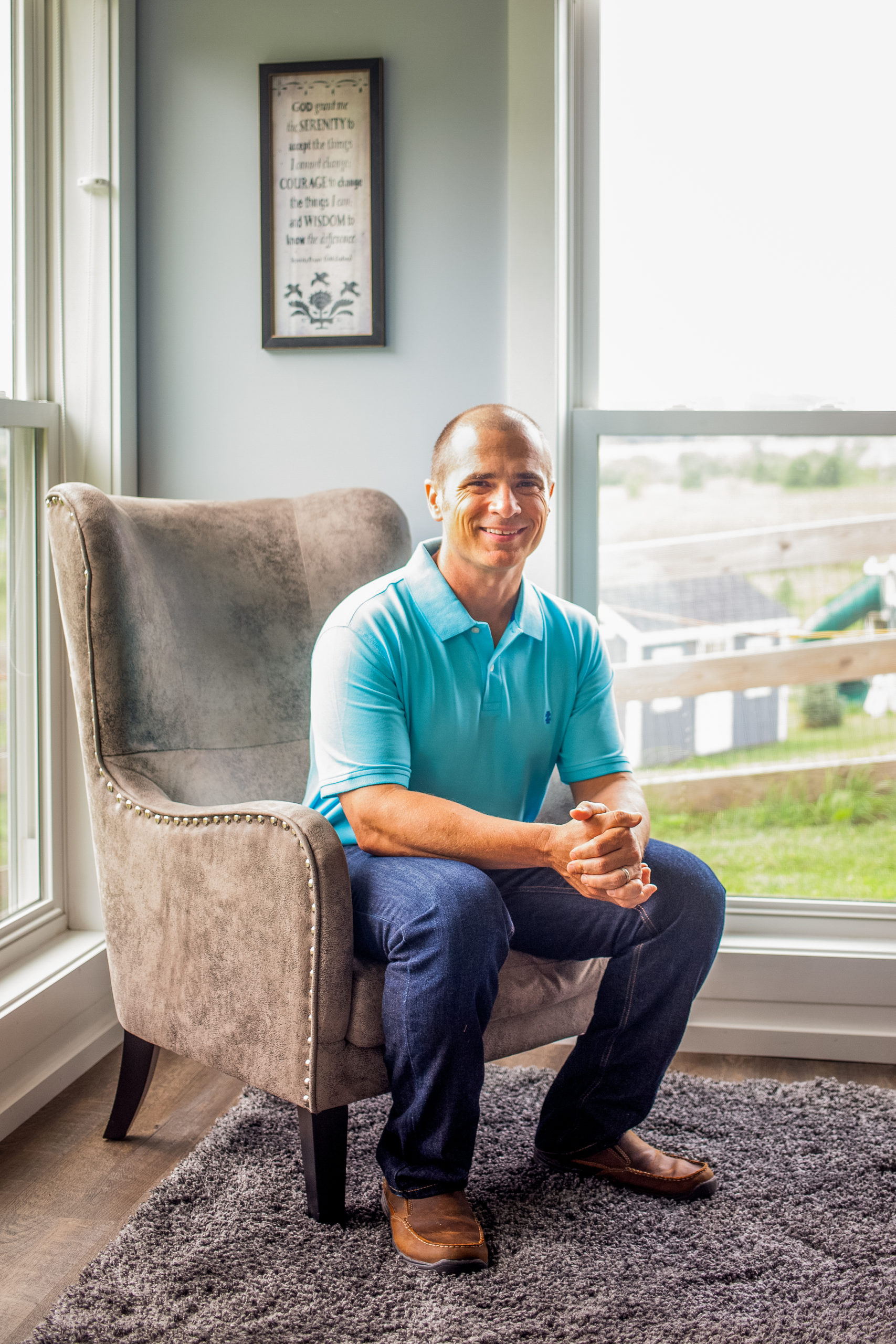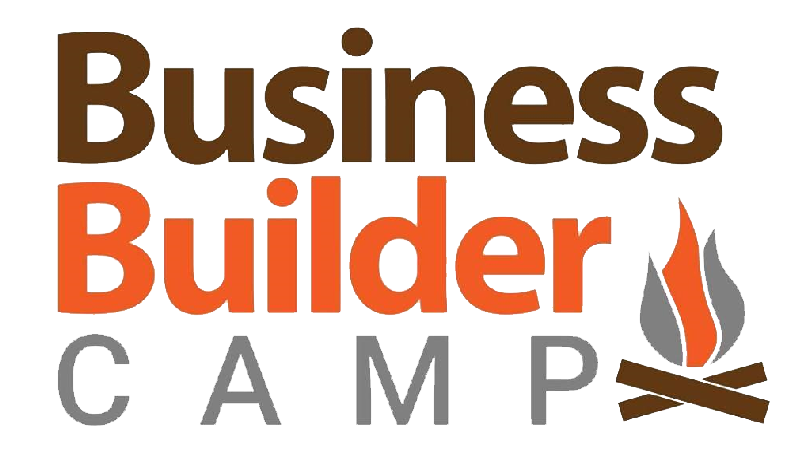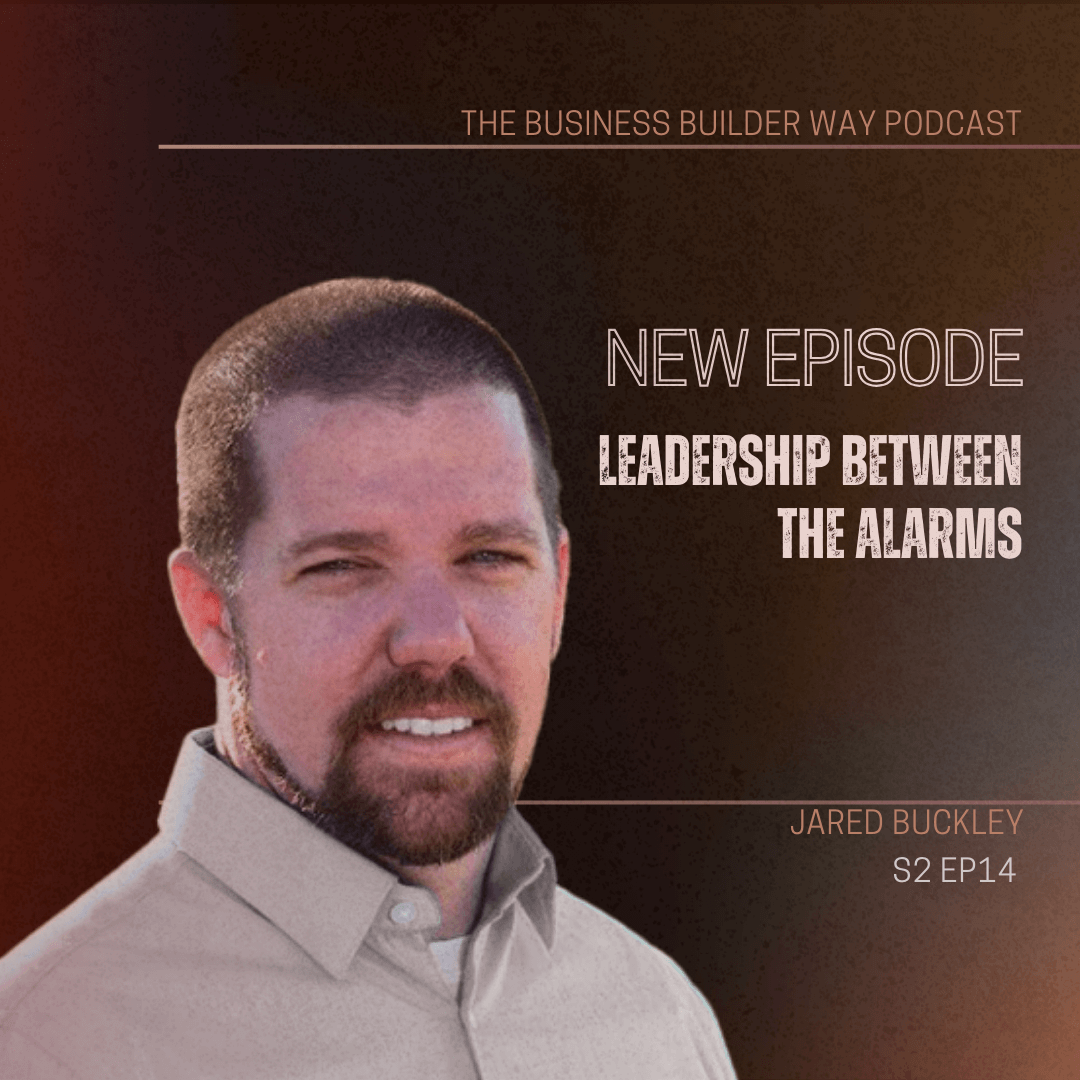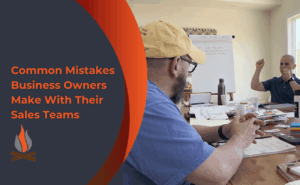Wayne Herring
Business builders. Today, we are joined by Jared Buckley. Jared is the Fire Chief Coach, and we'll talk a little bit more about that as we get rolling. But here on season 2, what we've been working on is interviewing our members of the builder groups, Our business builders who meet weekly and who also gather up live at events and talking about their businesses and lives and what they're creating. And, Jared, it's, So really good to have you here with us today.
Jared Buckley
Awesome. Thank you, Wayne. Glad to be here.
Wayne Herring
For sure. So on some of these, I've been asking people, Who are you and why are you here? But I'm gonna ask you, where are you? Because for those who are not watching a video, you have some interesting things in the background, it looks like a mask with a hose, and I see firefighters. Of course, I know where you're at. But earlier, you picked it up and actually showed us a room. Where are you and kinda show us?
Jared Buckley
Well, this room is called the fish tank, but it's a glass room, but this is just a bunch of decorations in a fire department. I'm at, their headquarters and this is up in Washington, but I don't live in Washington and I live in Arizona, and I have a A couple contracts up here travel 2 times a month and do coaching with chiefs From these 2 different departments and a couple one off things with other surrounding departments in this area.
Wayne Herring
Gotcha. So The fire chief coach, the work that you're doing, you are a coach, you're helping people to build leadership skills, live more intentionally, and I I know you're also helping firefighters who are like perpetually on and helping them to sort out life even in between the calls or alarms that they have. Right? But tell us, what is your business? What is this fire chief coach?
Jared Buckley
So I started into the coaching arena a few years ago, and I primarily was in just the business sector. And I got into it, and I was doing coaching, Consulting and training with the millennial generation. So how to manage millennials, and that's how I got my feet wet. So as I went into that arena, Slowly but surely, I started doing more around the idea of emotional intelligence and the emotional intelligence in leadership and and everything like that. Well, executives started asking me, hey, do you just coach millennials or do you coach, you know, us? What's the difference? Honestly, that's that was how I approached it. What's the difference? You're a human being, of course. Like, I I don't see the difference. So I started coaching More executive level stuff.
Got in contact with the fire department up here in Washington. They brought me in to do coaching with a a millennial. Did that for a few months, and then they asked, hey. Do you coach fire chiefs? What are these questions? Like, do I coach Executives or fire chiefs, I'm like, yeah. It's a person. Right? They are a person, but they're unique individuals. And I started coaching these fire chiefs, and primarily what I was doing was approaching leadership And emotional intelligence and leadership. I slowly learned a lot of behavior sets that were coming Out of these fire chiefs and how they've developed these behavior sets over the years of being firefighters.
I mean, The fire chiefs were firefighters at one point, and they rose up the ranks and started escalating everything that they're doing, getting promoted Into their level of incompetence, right, and they constantly butted their heads against things that they just couldn't do, they weren't trained for. What they didn't realize, it wasn't just competencies, they were skill sets or behavior sets or even mindsets. And so I started coaching these chiefs, and I realized I was doing a lot of behavior change in my coaching, A lot of mindset shift. So, one of the certifications I've got was NLP, neurolinguistic programming, and so that works with the unconscious mind. And as I was working with the unconscious mind with these fire chiefs, having to change stories for these guys, like, They're not running a fire call when they're in the office. So, I started asking questions, like, hey, what's your call? Now that you shifted in this, what's your call? So I started coaching really specifically to the fire chief and learning That there is a prototype now, they're not all the same, but there is a prototype of what a fire chief looks like and what they actually need coaching in on a leadership level. So that's how I dove into this and and really coaching on emotional intelligence leadership with fire chiefs.
Wayne Herring
Talk a little bit more about what is emotional intelligence, and how do you help somebody, I I guess you would say develop emotional intelligence or grow their emotional intelligence.
Jared Buckley
Yeah. So I'll teach it just like I teach I teach fire chief. Emotional intelligence, most everybody to some degree can understand just by the the terminology. Right? But emotional intelligence is simply this, it's your response level to your actions. Okay. So If from a fire standpoint, a incident happens, the incident gets To the dispatch. Dispatch goes to send the alarm, and when the alarm goes, resources are sent. That's fire terms in its basic form.
Emotional intelligence is no different. An Intangible incident happens into our brain. We start telling the story. We start telling what our perception is of the story. The dispatcher doesn't know what's actually happening. It's just perception. So the perception happens. It sends the alarm.
The alarms are the hormones that get sent into our system, The emotions that get sent into our system to resource or send the resources, the behaviors to what our emotions are doing. That's emotional intelligence in its simplest form. Got it. And from a buyer side standpoint.
Wayne Herring
Yeah. And so you help people see that and kind of harness that. That makes sense to me. And I so you are a business builder, you're a coach, And then you're building a business around coaching. You have a business around coaching, but you're working to take that work that you've been doing 1 on 1 to even more people. And you're in our group and you're around other people that have, Let's say, like, more traditional businesses, doctors' offices, remodeling companies, construction, funeral home, and your group. And As business owners, business builders, we often find, I think, that we're putting out fires all the time. So, it's helpful to have This perspective from you and other people listening can think like, well, if we're honest, we do often live in that zone of Firefighting, and sometimes we make fires, and sometimes we avoid doing proactive things to prevent Fires, and it's kinda crazy sometimes, I think, the behavior patterns that we can be in.
Jared Buckley
Yeah. In fact, you and I sent back a message about a little video of important urgent. I've used that illustration a times in my coaching sessions, the fire industry lives and operates in important and urgent. In fact, to such a high level that they don't even see that the others exist. In fact, if it's not important, it's not urgent. If it's not urgent, it's not important. Like, they block out just 2 quadrant, Non urgent, non important or important and urgent, and it is dangerous. Some of them, not all, some of them know it, They also don't know how to approach it either.
They see that the important, non urgent is important, and we need to invest in time. That's fire prevention. Fire suppression is the important, the urgent. That's what they've been trained in. This is where it's not much different from an executive. The important and the urgent is the sexy. Let's be honest. We don't get it as business owners because we think things are dull.
We wouldn't be there. So as a business owner, you're looking for the sexy, man. Let's go after him. Let's put out a fire. You started a business to put out a Fire, it was a problem. You went to solve a problem. You're just carrying a different hose line. That's all you're doing.
Mhmm. And so looking at it from that standpoint, Okay. Back off the sexy dude, go find what actually prevents the real problems. Get out ahead of it, because if you're relying on just your reactionary leadership, sales, fill in the blank, The thing's gonna overcome you at some point. You're gonna have some spot fire that tends right behind you, and you're done, you're engulfed, man.
Wayne Herring
So personally, I have things that are urgent and important right now in my work life, which is, okay, okay. Well and and maybe it's not even, like, Urgent, but, oh, kinda, like I have to be there. I have to do it. This podcast interview that, or interview that you and I are recording right now is in my calendar. It's a commitment. I'm gonna show up and do it. I have a bunch of coaching clients. We have time scheduled.
I'm gonna show up and do it. At the same time, I'm working to build my business, and I'm working on my ops manual for our business builder group to try to have A consistent way that we onboard new people, the way that we introduce them to their groups, things like that, which is more of that proactive. It's not urgent, but it's really important. But you're right. It's not very sexy. It's not very hot and burning at the moment. And then what I was gonna say to you is and ask you how you interpret this. On Monday night, I went to yoga, and I scheduled it for 7:15 at night because I had a bunch of classes I had bought as a package.
And, you know, I started to think I was too busy, and I almost canceled it. I almost didn't go. But I went. I did go, and it was this kind of like relaxing type yoga, where at the end you end up taking 10 minutes instead of Slack out. And I felt so good afterwards. Everything was so calm. But there's still all this, like, workload there that didn't go anywhere, the next day's calendar. But I I just hadn't felt that relaxed been a while.
Of course, I've got kids like you do and everything and a lot going on. Is that important to do things like that?
Jared Buckley
More so than we want to admit. You can't get to the level of fighting a fire, running a alarm, and running a call If you haven't put enough resources in before the actual action happens. So the whole idea of Pulling away and doing something that's important, not urgent. Right? Whether it be shoot mental health, whether it be personal, Family, spouse, whether it be taking your team out and doing a leadership retreat, There needs to be more time spent there than actual running the emergency. The reality, the emergency is only emergency for so long, and if you operate there too long, you get burned out. Your body is not meant to operate at that level for a long period of time. The fire service does an excellent job in maximizing stress induced hormones. They operate off of stress, but they also go back to the station.
And if you don't utilize that time between the alarms effectively, And you won't have the resources to run, the the actual internal resources to run at a maximum efficiency. So going to yoga, taking your wife, going on a trip. I mean, as you said, Wayne, like, I have 5 kids. That takes some time. Do I need to sit there on the phone and listen to my wife talk about our crazy kids and how she's ready to quit? You know, quickly, and, yeah, I need to listen to that. Why? Because that's part of the important non urgent stuff. My my marriage will go to waste if I don't spend that time there, and when will I see the the ROI there? I don't know. That's the problem.
We don't know when that return on investment happens, but small things matter.
Wayne Herring
Right.
Jared Buckley
Don't sweep them under the carpet because You don't know when the the ROI is gonna pop up.
Wayne Herring
Yeah. Other than you know, up until today, I don't think I've ever really thought so much about How business builders, business owners are very much like your fire chiefs in this whole, like, getting the resources, having the resources when there's an emergency. It's really good you have me thinking. But I wanna keep going on your stuff. So part of your mission is to help these fire chiefs between the alarms. Right? Your program that you're building uses that language. So can you share a little bit about What is it that you're building? What is leadership between the alarms? You're I think you're planning to do a a leadership intensive gathering. What are you building towards?
Jared Buckley
Yeah. So I was challenged by 1 of the chiefs because what I was doing was 1 on 1 coaching with chief officers. And they asked me, hi, okay, how do you take what you're doing and bring it down the line To company officers, battalion chiefs, like, take exactly what you're doing and just distribute to more. Well, okay. That was, like, 3 years ago. I'm like, dude, I don't know how to do that. So over the last 2 to 3 years, And specifically, about a year ago, when I was out with business builders and was challenged by a bunch of business owners, how do I do this? Well, The whole concept for me is leadership between the alarms. What happens between these calls to effectively Get you to run the calls correctly.
So whatever that call is. Right? So as I'm focusing on this and emotional intelligence, It's mental health, the behavior change, relationships at home, your stuff, all that stuff, it matters. That's what marks the leadership. It resources there. So doing leadership between alarms, well, got challenged by some of the business builder guys and and they said, hey, can you break this out? Well, I Yeah, I can. And so the concept came out as 5 Alarm Leadership, and it's progressional leadership. Intentional, strategic Mhmm. Progressional leadership.
1st alarm is what every call needs, and that's personal leadership. Every response needs personal leadership to that response. I don't care what response it is. I don't care what incident it is. It needs personal leadership.
Wayne Herring
Yep.
Jared Buckley
The second 1 is relational leadership. That's 1 on 1 relational. Not 3, not 2, it's 1 on 1. So how do I do the 1 on 1 Correctly. Next 1, communal leadership, teams, crews, shifts. 4th, tribal leadership, big organizations. Last one, transformational leadership. And so what I'm building right now and attempting to build is a coaching system In the fire service, specifically designed to fire chiefs down to company officers To build their leadership while we could do a training, I'm not gonna do that.
I'm doing a coaching experience, Like, this is designed to be coaching and what I'm hoping to do and planning to do is build a system that as guys get to a level, Guys, gals, it gets a level of third alarm leadership, that community leadership, there's a feedback loop, they come right back into the personal leadership and start leading the others the same way. Okay. So I'm trying to develop this system and it's not gonna be a 1 year process, 2 year process, it's a long process.
Wayne Herring
Mhmm.
Jared Buckley
And so that's what I'm building right now is the five zero one leadership, really the leadership between the alarms.
Wayne Herring
And so ultimately, your goal is to impact more of these chiefs and officers that are in these fire companies. Why does this light you up? How will this make the world a better place? Oh, good. You're smiling. Yeah.
Jared Buckley
I know what resources I've been given. I know what I've been provided in my life. I know what exercises I've gone through that has put me in this position. There is a unique alignment to me and firefighters with fire chiefs, the the fire service. I connected really well with them, but there's also a big gaping hole in the fire service that has a relation to leadership, as it relates to mental health. These people have walked into the fire service understanding that they are walking into a sack sack of career. They understand that they're in the business of loss mitigation. That loss mitigation has transformed not just to Fire prevention and and property and people, but it's their own loss mitigation.
It's their own life. And so a lot of these firefighters are sacrificing themselves for the benefit or for something else, and they've blocked up their Lives, they've ruined their family, they've ruined their marriage, they've ruined their health, and all for Serving, Serving, right? Someone needs to serve them. Someone needs to provide for them. And if for some way, somehow, I can do a little something for my brother, who's a fire captain, Did somebody else's brother's gonna get served? Because I tell you right now, a bunch of these individuals are completely blocked off and will not let you in. And I'm walking into a fire service that they don't let you in. It's a fraternity. You better have credentials. You better have Back in you better have a referral to all of this.
I'm trying to do something very much impossible because I was never in the fire service. And so that's my call. That's literally, that's why I'm doing this.
Wayne Herring
So I'm gonna transition as we're Kinda getting towards the end of of our time together, transition into you have experienced being Fire chief in a sense, though. Like, I get it that you're not you were an EMT, but you weren't in the fire service. You have family in the fire service, And your wife's family ranch almost burned down, and there were fire people there. I remember. But you and your wife, Steph, And your children, you've had it in this could be the subject of a whole another podcast. Right? But you've had some health challenges and you've been in super stressful situations Where you got a major call and had to resource it. As you say, you've been touched by some pretty traumatic experiences and We've gotten through to the other side. That really has prepared you in a lot of ways to serve other people here, hasn't it?
Jared Buckley
Yeah. Without a doubt. That is part of the the experience and the resources I've been provided. So our oldest daughter was born with Down syndrome, and Before she was born, they they told us that she would have 60% chance to survive, and they said she had a heart defect, heart abnormality. And we went through the pregnancy, and then she was born, and then 3 months after that she had open heart surgery And they had it fixed. Basically, she was missing the entire wall in her in the middle of her heart, so she didn't have a full Left side and right side. And so the the blood was just mixing, and so that's it. She would turn blue.
She'd go into congestive heart failure. Not always fun seeing a 2 month old just turn blue and go into congestive heart failure. And throughout the whole process my wife and I went through, People started asking us questions, saying how how long will we get through this? And, 1, obviously, it was our Faith. Our daughter's name is Faith, but it is it was through our faith. And, you know, Jesus was our foundation to all of this, but what I had to do As I kept on getting this question was, okay, how do I walk this backwards and figure out what I did and what we did? And so for the next 5 years, I I took the time to look at how we did this, and it really came down to 2 words. And the 2 words that I use is called flip it. We learned how to flip the story that we were running in our head. And when we go into the incident response and it goes into dispatch, We work the dispatch alarm system.
The dispatch was the perception. It was the story that we're telling ourselves of what we think has just happened. Well, here's the thing, there's only 1 person that controls the dispatch, and that's me. If I can work to control the story that I have, then I control the alarm being sent and the resources that we have. So, I broke it down to, hey, what is a flip? What does it flip? There's 3 stories that can do the most stress. I don't have. If I'm running a story that says I don't have, I don't have the resources, I don't have the relationships, I don't have the possessions, the money, whatever, I don't have. Heavy stress induced.
The second one is I cannot, Now we're talking about competencies. I'm not able to, I can't run a mile, I can't run a marathon, I can't Go across the store. I can't, I can't, I can't. We run that story, it starts to induce some stress. The last and most powerful one And the one that people run into, as soon as I hear their story coming to me and they start talking, I have to go after this one. If it goes here, This is a really big issue, I am not. If I'm running the story that I am not That is the core value. That's a belief system of who I am as a person, and it'll affect that I can't do, that I don't have.
So, I gotta go after the I'm not. And how do you do this? You change your story. I am. Flip it. Flip. I am what, because anything your brain here says I'm not, it's gonna send that stress. Boom, boom, boom, and you're gonna shut off. You're gonna go, I'm threatened in this position.
I'm gonna go and survive. I back out. I isolate. I do whatever. So change a story, then I am, I'm a great father. I'm a powerful individual. I'm able to overcome all scenarios. I am, I am, I am.
The most ideal way to do this is change your Flip your I am in the actual thing that it's I'm not. So if I'm not a good father, find where you are a good father. If you still can't do that, and you're like, dude, I'm too stuck Find us something else. Do anything else. I'm something else. Your brain needs a positive reinforcement. So hijack the system and find that I am somewhere else. Your brain just needs that right hormone being sent into your whole system.
So you flip your story. I am, I can, and I do have. That's a little bit of the story of our daughter and what she taught us, Not to mention she had 2 more open heart surgeries 2 years down the low and down the road. And then we had another kid that had open heart surgery too, but that's, you know, Whatever. After you have 1 kid with open heart surgery, you just have 2, whatever. No big deal.
Wayne Herring
Right. Yeah. Right. And and so, But part of these podcasts is for people that are new to business builders, get to get to know other members, or if they're considering And to learn who are people in the group. So now you've told us, you know, about a little bit about 2 kids and surgeries. But what's the good stuff? What do y'all do on the weekend or weekends when you're not
Jared Buckley
working. Kids, man. It's sports. Right? We have 5 kids there at the ages of 14, 10, 9, 8, 5. Right? So we're in the world of sports and we're sports fanatics. And so Every day of the week, kid you not, every day of the week, Sunday included, we have some type of sports going on, and that keeps us really busy. It challenges us. We have to over communicate, but also at the same time, we love it.
And we find where our greatest Resource should give back in that process. It builds our relationship with the kids. It trains them up to be the people we want them to be, And so our job is never done.
Wayne Herring
Yeah. Nice. And the last thing that we're working on in this series is, And you alluded to how you had some fire chiefs who were kind of pushing on you to build this business a bit. And then also that you went to in January of 23, we were in Savannah, Georgia in a group of Business owners, and they were pushing you. And you've been in other mastermind groups too. So, like, you really have, I would say, a strong Right? To weigh in whether it's our business mastermind group or some other mastermind group, what advice would you give to somebody to use this resource that was, I don't know, like, one of the first times it was talked about in published books is when we were thinking Napoleon Hill and thinking Grouwer etch talks about the power of the mastermind. Right?
Jared Buckley
Right.
Wayne Herring
What advice do you have for people to get the most out of a group?
Jared Buckley
I I mean, anybody that's listening to this, they're probably very aware of you're the The replica of the 5 people you can spend the most time with. Something to that frame. Right?
Wayne Herring
Close enough that yeah. That's what Jared says in it. Yeah.
Jared Buckley
So this is what I'd say about Mastermind. You wanna invest into something that's not gonna have the urgent result. You wanna invest into something that's gonna have a long term effect, and the mastermind is that. You don't get a return on investment because you spent 6 months in a mastermind. You get a return on investment Because you surround yourself with people that are willing to challenge you, willing to hear you, and give a different perspective. That's part from my standpoint, I sit and listen a lot in a Mastermind, and the reason I listen is I never know what might happen that can produce something down the road. You can't plan for that always, you can't control it always, but you do have to be present, you do have to Put yourself in availability to understand that something might happen and if I'm investing into this over 2 years, It might be 5 seconds, but 5 seconds can change your life, so put yourself in a position that's gonna challenge you and do something different, but do it differently. Don't do the same thing you've been doing.
Do something different. That's why the mastermind, it's It's always different because you have different people from different industries with different backgrounds, different beliefs, whatever. Be present, put yourself available, and see what actually might happen. You'll probably be surprised eventually. Might not be right away, but eventually, keep going.
Wayne Herring
So I love how you it's very similar to how you started this thing, talking about being more proactive and not always living in the state of putting out fires. There's things out there that we can go do that are like, Hey, here's 5 steps to generate leads on Facebook, for example. And that's great. Right? And that's a very active, urgent, and important to you and your business right now. You wanna learn how to do that, and you wanna put a process in place, That may be important to somebody. But what I hear you saying is that masterminding your experience with that is a little bit more of a a slow burn. It's like immersing yourself in with these ideas and these people. I also like what I heard within what you were saying is giving As much as you're getting, you have to have faith that that's what's gonna happen over a longer period of time, that if I pour into other people, they're gonna pour into me too.
Jared Buckley
Yeah. I mean, it's just the natural flow of things, the the reciprocal element. However much Time you invest is how much time you're gonna get out. Can't dispute that fact, right? And if I want to provide something for someone, your brain, your mind, It opens you to that. So it's just it's amazing how the brain works and and how the mental side works. Like, Hey, I'm serving someone, I'm giving to somebody, not expecting anything on return. So you can't hijack the system. I can't give to to get it, but also understanding the simple truth that you do give, Something will come back.
You just can't sit there waiting. Hey, I gave, okay, it's like my kids, right, I gave, when do I give back? Like, No. Give. And sometimes the give back is just you give too. So
Wayne Herring
The last question, if that's the case that masterminds are something that you have to be in it, and it takes some time, and you're building relationships. There's lots there there's lots of peer groups and masterminds out there. What advice would you get give to somebody for how to pick the right group for them?
Jared Buckley
That's a good question. You know, I don't have an exact answer to that, and and maybe that's the answer. There's a lot of feel to this, and I I like, Wayne, like you said, I've been a couple masterminds. And some of them are good, some of them are okay. At the end of the day, to be honest with you, I really haven't had a bad experience in a mastermind. There's some that I just it it fits better, And I think the the certain people in it, it fit. Sometimes it was a circumstance in the season, like, for me personally. But I do remember my wife saying at one point because when you and I talked about this, I was in the mastermind with you guys, And there came a point, I was like, dude, I might need to step out of this.
And my wife was the one that goes, When you look back on all your success and everything you've done in your business, when have you seen the most success? And she points back. She goes, it's been in a mastermind. It's been in a group. Stick through it. Just just stay in it. It's wise advice. Listen to your wife.
Wayne Herring
Yeah. Right? That's probably a good place to end. Jared, thanks for joining us and sharing your story, And we are all cheering for you because we all benefit in our communities. We hope we never need it, but Ultimately, somehow, us or family members are touched by people who are firefighters, paramedics, so on and so forth. So good work you're doing in the world, and It's a joy to to get to spend time with you every week. So thanks for showing up today too.
Jared Buckley
Awesome. Thank you, Wayne. I appreciate it.
Wayne Herring
You bet.





